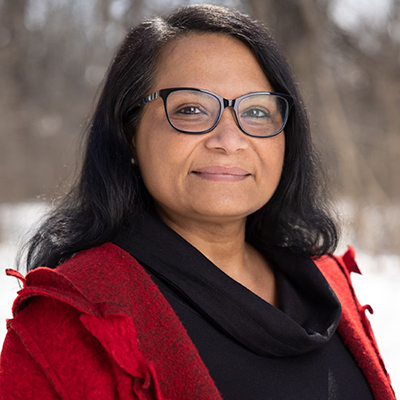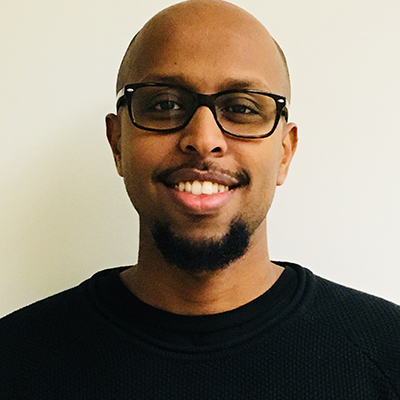The Graduate Fellowship for Academic Distinction (GFAD) provides necessary support and resources for emerging leaders to explore complex global issues. Up to two years of funding is available for master’s degree students and up to three years of funding is available for doctoral students.
By Elaine Smith

When Bipasha Baruah was accepted into the PhD program in environmental studies at York University, receiving a Graduate Fellowship for Academic Distinction (GFAD) was an invaluable aid to the international student from India.
“It made a big difference,” says Baruah, now a professor of women’s studies at Western University and Canada Research Chair in Global Women’s Issues. “It meant I could focus only on school and allowed me to do my PhD in a very short period of time and put me on a solid footing for starting my career.”
It also put Baruah in the company of students from 68 other universities and consortia in 44 countries worldwide who have benefited from these scholarships. Established by the Nippon Foundation in 1987 and administered by the Tokyo Foundation for Policy Research as part of the Sylff Program, the global fellowship program aims to nurture “leaders who will initiate action to transcend differences and address issues confronting contemporary society.” The Tokyo Foundation for Policy Research notes that “the qualities such leaders must possess will change as society changes, and forms of effective leadership will invariably differ from one region to another.”
Each university, a group that includes Yale, Princeton, INSEAD and the University of Nairobi, received a $1-million endowment to establish two or three annual scholarships at both the master’s degree and PhD levels. York was named to the program in 1989 and its GFAD scholarships are earmarked for students in the fine arts, environmental studies and political economy.
“The Graduate Fellowship for Academic Distinction has provided the necessary support and resources for our emerging leaders to explore complex global issues such as human rights and sustainable development in Africa; environmental resource conservation; the political economy of digital media; and the hydro-electric environmental disaster that affected Indigenous communities in Manitoba,” says Rhonda Lenton, president and vice-chancellor of York University. “As a research-intensive university committed to securing a more sustainable social, economic and environmental future, York University is proud of our longstanding partnership with the Sylff Program, and our shared commitment to advancing the public good.”
Izumi Kadono, president of the Tokyo Foundation for Policy Research, says, “We appreciate the longstanding collaboration on the Sylff Program with York University. It is terrific to see the quality and diversity of the students attracted and supported through this program at York University and the societal impact of the program alumni.”
Students who apply to York for graduate work in the appropriate fields must be nominated by their program to be considered for a GFAD, based on their academic accomplishments and high potential for leadership in international affairs, in public life and private endeavours. Up to two years of funding is available for master’s degree students and up to three years of funding is available for doctoral students. Between 2000 and 2020, 108 York students were selected as the recipients of this award, totalling $2,272,689.
For Baruah, it was one of the deciding factors in choosing York for her graduate studies, along with the flexibility to do interdisciplinary research. Her thesis brought together environmental science, urban planning and feminist economics.
“I also had other acceptances, but I was motivated to remain in Canada because my schooling was fully funded,” Baruah says. “GFAD gave me a big boost in the early years of my PhD, which are critical. It’s when people who are struggling the most and are trying to find their place.”

Mohamed Duale is a York PhD candidate in education who relied on GFAD to see him through the first three years of his doctoral studies.
“Honestly, I was elated when I learned I had been awarded a GFAD because it removed a lot of financial uncertainty, especially in Toronto, one of the most expensive cities in the country,” says Duale. “It allowed me the freedom just to focus on my studies and research, and it also offered a connection to a global network of fellows. The biggest reward, however, was an acknowledgement of the work I’d done.”
After earning his master’s degree, Duale spent seven years working for non-profit organizations and teaching underprivileged students before returning to graduate school in 2016. A former refugee from Somalia himself, he is also earning his graduate diploma in refugee and migration studies and working part-time for the Faculty of Education’s Borderless Higher Education for Refugees Project (BHER), which “believes that the provision of quality higher education to refugees and locals will contribute to the conditions for justice, sustainability, and peace in Kenya, Somalia, and the surrounding region.” (BHER is co-delivered with partners in Sub-Saharan Africa and overseas and supported by the Open Society Foundations.) Duale dreams of working in academia, teaching, doing research and “expanding the possibilities of what education makes available.”
In 2020, Duale was awarded the African and African Diaspora Studies (AADS) Dissertation Fellowship at Boston College, one of the most competitive fellowships in the social sciences and humanities in the United States with a stipend that has allowed him to focus on finishing his dissertation.
Professor Thomas Loebel, dean of Faculty of Graduate Studies and associate vice-president graduate at York University, would like to see more departments nominate candidates for these prestigious scholarships because they support young scholars with great potential. Applications are due March 1 of each year.
“Over our decades-long partnership, the responsibility for overseeing this prestigious scholarship has understandably changed hands many times,” says Loebel. “Nonetheless, our commitment has remained robust and aligned. I would like to thank the foundations which contribute so supportively to this award for their friendship and thoughtful engagement in working towards a shared vision. We look forward to continuing our collaboration through the Sylff Program and exploring potential new areas for co-operation.”


